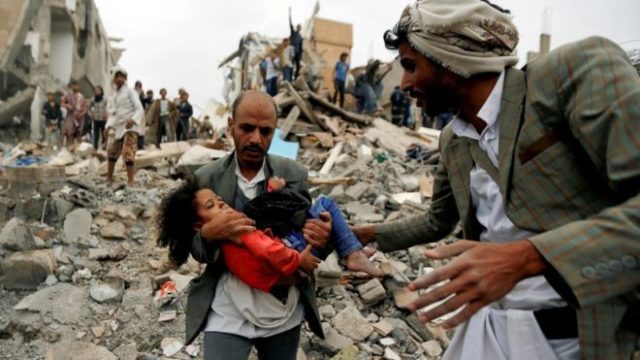
Yemeni pro-government forces, supported by a Saudi-led coalition, launched an offensive Wednesday to secure the port city of Hodeidah from the Iranian-backed Houthis. Control of the port remains necessary to provide aid to Yemeni civilians, and international organizations fear that the ongoing offensive may disrupt access to supplies traveling through Hodeidah – prolonging the humanitarian crisis.
Currently, Arab warships and fighter jets bombard Houthi strongholds to support the Yemen army’s ground assault coined operation “Golden Victory.” According to CARE International, one of the few remaining aid agencies in the country, the coalition of Arab states launched 30 airstrikes on the port within half an hour of beginning the assault. Additionally, Reuters reported that Apache helicopters carried out intensive air strikes on a coastal strip near the city’s airport. In response, the Houthis deployed military vehicles and troops to the center of the city forcing civilians to flee to the countryside.
The mission to liberate the port began three days after the deadline set by the United Arab Emirates for the Houthis to vacate Hodeidah passed. Houthi rebels, who originate from northern Yemen, have controlled the city since fighting began in 2015. Iran continually aids the Shiite fighters, using the Hodeidah port to bring in offensive weapons such as missiles and small arms. Houthi fighters have used the missiles to target Saudi Arabia. Last week, the Kingdom’s air defense systems intercepted a rebel-launched rocket targeting the southern city of Khamis Mushait. Saudi Arabia fears an Iranian stronghold in Yemen would offer strategic access to its regional rival.
While an intervention may be necessary to expel the Houthi rebels and to ensure that Iran does not achieve a permanent foothold in Yemen, a military offensive could halt crucial aid to the region.
The port in Hodeidah serves as the principal lifeline for nearly two-thirds of Yemen’s population, which relies almost solely on the imports from the haven for food, fuel, and medicine. According to the International Committee of the Red Cross, any battle in Hodeidah will exacerbate the suffering of the population because “life-saving items cannot be given to those in need while fighting is ongoing.” According to the United Nations humanitarian coordinator for Yemen, the ongoing battle in Hodeidah could cost up to 250,000 civilian lives, as well deny humanitarian assistance to an overwhelming number of people – putting at least 8.4 million civilians at risk of starvation. Save the Children reported that 130 children were dying of starvation every day, with 50,0000 children having perished in 2017.
As the operation in Hodeidah continues, Western nations and powerful Middle Eastern actors hope that latest intervention will expel the Houthis from the critical seaport, cutting off Iran’s supply of weapons to the group, and leading to a decisive victory.

